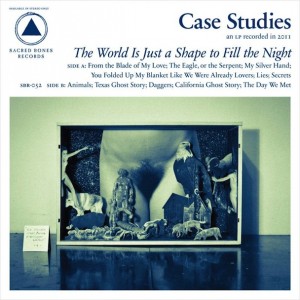As a label, “folk music” doesn’t do much for an artist of any kind – especially when what they’re making is essentially some form of folk music. But being such a bland and undescriptive tag, it doesn’t say much more about the music than the fact that it’ll probably have acoustic guitars in the same way something called “rock music” would be expected to have electric guitars. And then there’s the problem of stereotyping too, which is so very easy for cynical music listeners of any kind to partake in when approached by something they can’t quite put their finger on. Hence why additional tagging and labeling comes into action, creating a whole host of sub-genres for listeners to cast artists into further, like “punk rock,” “death metal,” and “doom folk.”
Enter Case Studies, the solo project of Jesse Lortz who is most famous as one half of The Duchess and The Duke. First impressions will likely have many reaching for their big unspecific “folk music” tags but a little consideration reveals his album, The World Is Just A Shape To Fill The Night, as something much more. It’s easy to want to reach for the “doom folk” tag to narrow things down a bit more but not only are there no origins from metal here, nor is the whole thing seeped in a relentlessly bleak sound. In fact the overall sound can be downright chipper at times, recalling sprightly acts like Edward Sharpe & The Magnetic Zeros. Guitars jangle, piano keys ripple like they’ve been recorded from a jaunty saloon session while vocals harmonise and lift the spirit of everything around.
And these elements would add to equate something welcome enough to play out the summer months if it wasn’t for one simple fact: Lortz is depressed as fuck about the world. His cynical and gloomy outlook has him singing of faces begging for the dagger in his hand and the possibility of death being an accident, like it’s all he can see around him. Straight from the first track, “From The Blade Of My Love,” things seem hopeless. In Lortz’s world love isn’t something that will bring light to the darkness but instead something that will destroy everything good about another person. “I’m ashamed of the wounds I have opened with the blade of my love” he sings with what sounds like genuine regret.
The intriguing and strange point of the record though is the juxtaposition. Chords might stay in minor keys but the aforementioned vocal harmonies tend to be the thing that lifts the music out of the dark recesses of Lortz’s mind and, for the majority of the tracks here, create genuinely pleasing hooks. “You Folded Up My Blanket Like We Were Already Lovers” offers the memory of being “a long, long, long, long, long, long way from home” in its infectious chorus as a double bass bounces back and forth. It’s easy to imagine the song making its way onto radio were it not for the skewed first line where he recalls “You lifted up your skirt and took a piss right in the street.” While “Dagger” and “Lies” might have rather morbid and depressing hooks they still wriggle their way into your head while the heavy up-front jangle of “Animals” and “Secrets” practically demand you to open your memory to them, especially the latter when Lortz snarls the album’s title as part of the lyrics.
Elsewhere the appealing hooks are a little more subtle but just as pleasing to the ear and come in the form of the emerging vocal harmonies. On his own Lortz is appealing and comparisons to Bill Callahan aren’t too far off, but he seems less intent on the idea of negative space and instead brings forth his songs straight up, ready for you to welcome them at your own will. But when he has a group of females singing behind him the appealing effect can increase greatly. On “The Eagle, or The Serpent” voices swirl about him like ghosts in a graveyard before accumulating to an almost dizzying final section which increases the tension with just the addition of a simple drum beat. On “Texas Ghost Story” and “My Silver Hand” he uses much the same idea although with a lighter atmosphere around him, creating something of an optimistic tone on the latter track. “Texas Ghost Story” is probably the best example of how effective and redeeming the backing vocals can be as he concludes the track by openly begging for the character in the song to “take me with you when you go.”
And Lortz does have hope in his words, his voice and his music. Even though he might sound impossibly bleak at times (the almost hopelessly gloomy “California Ghost Story” for instance), it sounds purposeful. As much as he sounds like he’s been hurt and threatened (or threatened others), the overcast feel of the songs sound like a way to work past all of it. On “You Folded Up My Blanket” he seems to take a moment out to recall a genuinely happy moment in his life when he spent some quality time with someone whose company he enjoyed, without actually being in love; while on “My Silver Hand” he concludes that even though the relationship was a failure, without it he’d have “no songs about remembrance, no songs about forgiveness, no songs of me and you.” Sometimes a dark period in life can lead to lighter time. Sometimes that light at the end of the tunnel isn’t that of an oncoming train.

